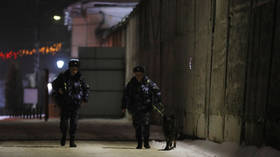Russian response to prison torture scandal will be important test

Last month, chilling footage of rape and torture at a Russian correctional facility caused global outrage and began a series of lengthy investigations and dismissals of the officers purported to have been behind the abuse.
In the clips, correctional staff can be seen subjecting inmates to humiliating, horrific ordeals, including violating them with objects and forcing them to perform sexual acts on camera. The orchestrator of the cruelty claimed the videos were to be used as blackmail in the future.
While this may be one of the more shocking instances of human rights violations in prison systems, it sheds light on how Russia and most other nations need to crack down on human rights breaches behind bars. The scandal should serve as a much-needed push for governments to better protect the incarcerated, from Moscow and beyond.
A history of failure
Russia is, understandably, still grappling with the allegations, and the founder of the human rights group that leaked the clips has told RT there is more still to come. As horrific as they are, the purported crimes are but a drop in the bucket of assault, torture, rape and other wrongdoing alleged against correctional officers not just in Russia but worldwide.
Many such examples come from the US, where activists are seeking to reduce the number of those handed custodial sentences. The country is notorious for reliance on and liberal usage of solitary confinement. Solitary confinement, which mentally harms those subjected to such treatment, can be considered torture in cases where the detention is prolonged, solely used as punishment or as a means of intimidation or coercion. America has many such instances reported, with a far larger network of NGOs and legal advocates dedicated to improving the system; until last month, Russia had almost no well-known equivalents.
Through their work, we have a sense of the scale of sexual and physical abuse plaguing US prisons. A Department of Justice investigation revealed that staff sexually abused female prisoners at a New Jersey correctional facility repeatedly. The DOJ has also sued the Alabama penal system due to gross negligence in failing to protect inmates from abuse. In another case, several corrections officers at the notorious Rikers Island Prison Complex were sentenced for severe beatings and abuse of inmates under their watch and control.
And that is just a tiny morsel of what we know occurs in the United States.
In England and Wales, close supervision centers have come under fire for putting criminals in isolating conditions that the UN warned may amount to torture. Some prisoners have spent over a decade in solitude where more than 22 hours of their lives are lived in daily confinement. Human rights watchdogs have also slammed unjustified physical violence in three British prisons, where guards reportedly punched compliant inmates to keep them in their place.
As yet another example, France has a startlingly long history of human rights violations within its prison system. The European Court of Human Rights has dealt with France’s abuses repeatedly, and in 2015, the Court condemned France for neglecting a severely disabled inmate. French courts have also dealt with a multitude of cases against their own jails.
As people dig up more and more evidence and former inmates become more willing to share their stories, it has become readily apparent that most governments unknowingly turn a blind eye to the human rights violations occurring on their home soil. The unfortunate reality is that penal systems around the world fail to protect the rights of the incarcerated – despite clear laws and conventions that plainly spell out what is and is not acceptable.
What matters is that activists, politicians and officials bring them to light and are protected when they do so – for that reason, the latest scandal is an important test of Russia’s resolve to fix the problems.
Cruel and unusual
In the Russian Criminal Code, there are evident principles cemented within the law that define punishments for wrongdoing as well as protect victims, the public and even the perpetrators of crimes themselves. One such principle is the idea of “humanism”, which is meant to protect the dignity and rights of a class of people under direct observation and control 24 hours a day, seven days a week.
Many countries have similar principles either directly stated in their criminal codes and constitutions or implied in any corresponding case law. At the international level, multiple covenants and agreements fix various standards and legal norms into writing. The international community universally accepts many of these norms as fundamental – meaning all states should honor them. A prime example of these basic and essential standards include the banning of torture and other human rights violations.
Some may wonder why criminals – especially those sentenced for especially dangerous or heinous crimes – are even afforded such protections in domestic and international law. The answer is as simple as the fact that modern society strives to do better than the wrongdoers and that many nations recognize the inherent, inalienable rights and dignity that all individuals possess. To ignore society’s social progress and turn one’s back on the natural rights of others would be to abandon one’s humanity.
However, the protections on paper do not stop the global flood of instances of prisoners succumbing to wounds inflicted by guards, legal cases exposing methodological rape and leaked tapes of various acts of torture.
Tackling the problem
So, what of the leaked footage? The director of Russia’s federal prison services quickly dismissed multiple officers in connection with the incident. Some of those dismissed are currently at the center of criminal investigations and facing prosecution. These swift actions by governing bodies show at least some understanding of the immensity and implications of such crimes, and the public outrage seems to have added to the sense of urgency.
News agencies, including RT, presented the outcry against the horrific show of human rights violations in Russia as a pressing concern. And rightfully so – such a blatant abuse of power shows how easily atrocities can fly under the radar of the public eye when they take place behind bars. The whole situation and the ensuing uproar from the global community have proven that something needs to change – it’s not enough to just be outraged every time something happens and then let it return to normal.
As a start, governments could push for more cohesive legislation that protects inmates. A re-look at what constitutes a lawful and unlawful punishment would present a concrete legal basis going forward – something that could further ensure specific acts do not fall through the cracks on a technicality. Improved resources and better advocating for the incarcerated could lead to better legal representation for victims of inmate abuse and more public awareness of an issue that plagues prisons everywhere.
Before it is all said and done, the outrageous and unethical instances of abuse in Russian correctional facilities do not have to stop at being only a scandal. Instead, they should serve as a wake-up call for the global populace and governments that some of the worst atrocities take place just next door. Domestic human rights violations may be an ugly truth, but it does not have to be this way going forward.
Instead, it is better to learn from the situation and eliminate a problem that has continued worldwide for far too long.
Like this story? Share it with a friend!
The statements, views and opinions expressed in this column are solely those of the author and do not necessarily represent those of RT.
The statements, views and opinions expressed in this column are solely those of the author and do not necessarily represent those of RT.
















